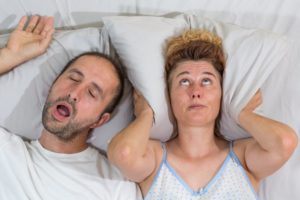 Suffering from sleep apnea robs you of the ability to function normally and effectively, so it may be tempting to try out many different alternatives in an effort to rest better. Your local dental sleep specialist warns that there are certain methods of treatment that should be avoided. As you read on, you’ll learn what they are and why they shouldn’t be used with sleep apnea therapy.
Suffering from sleep apnea robs you of the ability to function normally and effectively, so it may be tempting to try out many different alternatives in an effort to rest better. Your local dental sleep specialist warns that there are certain methods of treatment that should be avoided. As you read on, you’ll learn what they are and why they shouldn’t be used with sleep apnea therapy.
Sleep Apnea Explained
Sleep apnea is the temporary pausing in breathing that occurs repeatedly throughout the night. The most common form of the condition is Obstructive Sleep Apnea (OSA), which involves the airway being partially blocked from collapsed throat muscles.
As a built-in form of protection, your brain sends a distress signal through your central nervous system that causes you to wake-up and reinitiate breathing. Because this happens several times throughout the night, you’re deprived of the proper rest you need and left feeling tired and lethargic the next day.
Why Can’t I Take Sleeping Pills?
Here are the two major reasons why you shouldn’t take sleeping pills or other forms of sleep aid if you suffer from OSA:
- They Mask the Problem – Although it may seem that the primary problem is a lack of sleep, the main issue that needs to be addressed in cases of sleep apnea is the obstruction of your breathing. Thus, taking a sleep aid doesn’t get to the source of the issue.
- They Can be Dangerous – In addition to only providing a “band aid” effect, taking a sleep aid can be dangerous. As mentioned earlier, your body has a built-in protection mechanism that awakens you when there is a pause in your breathing. A sleep aid could retard that process and leave you in a life-threatening predicament.
A Safer Route
The better method for relieving your problem is to visit your dental sleep specialist to receive sleep apnea treatment. Thus, the symptoms can be identified, the causes diagnosed, and the best treatment protocols can be recommended.
One highly effective treatment method that you could benefit from is an oral appliance custom-designed by your sleep dentist. Worn at night, the oral appliance helps to keep your airway open and can be used in conjunction with other forms of treatment to provide the best remedy.
If you’re not getting the rest you need and desire to have the problem corrected in the safest and most reliable manner possible, then reach out to your local dentist to schedule a consultation today.
About the Author
A graduate of the University of Southern California School of Dentistry, Dr. Pamela West has over five years of experience treating sleep apnea. A member of the American Academy of Dental Sleep Medicine, she is partnered with a vast network of medical experts across Nevada ensuring that patients get the best treatment possible. Dr. West helps patients rest better at iSleep Solutions, and she can be reached for more information through her website.
